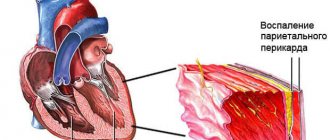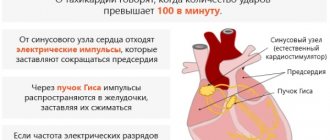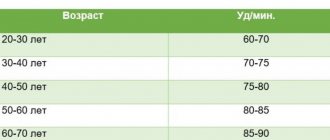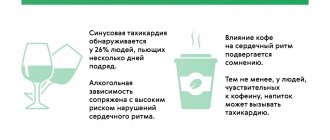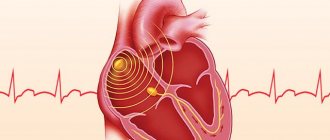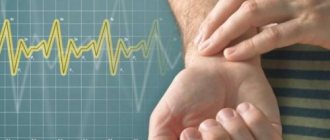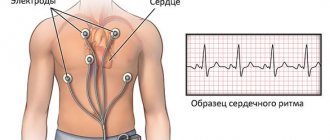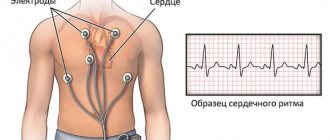Post-Covid tachycardia is a widespread phenomenon. According to the results of a study conducted by Swedish scientists, various types of rapid heartbeat are observed in 25-50% of people suffering from post-Covid syndrome. Sometimes they remain unrecognized due to the insignificant severity or absence of complaints about heart problems.
Consultations are carried out by appointment. Call the operator at number 8(969)060-93-93.
Norm
First, let's define what a heart rate of 125 beats per minute means. For adults, doctors consider sixty to ninety beats per minute to be a normal value, but for children it is higher. The exact figure depends on the age category. A person’s lifestyle and environment seriously affect their heart rate. For example, in the evening it will always be higher than in the morning after waking up. During physical activity or anxiety, the value also increases.
How to help
What to do depends on the severity of the attack. If the symptoms are mild, it is enough to provide rest and give a decoction of yarrow, valerian root and lemon balm. It is important to pay attention to the psychological state. For emotional instability, you can use mild herbal remedies with a calming effect. If paroxysms recur, you should consult a doctor.
In case of a severe attack, you need to call an ambulance, lay the person in a comfortable position, unfasten tight clothes, loosen the belt, open the window for sufficient fresh air. Severe cardiac tachycardia after coronavirus may be accompanied by panic. It is impossible to give the patient sedatives - this can distort the clinical picture and complicate diagnostic measures.
Provoking factors
A high pulse does not always indicate pathology. Some factors that provoke it are only temporary. We are talking about sudden stressful situations, fear, and taking medications.
Excessive consumption of alcoholic beverages, for example, during a celebration, as well as overeating and high emotional stress can also provoke this pathology. Doctors note that during the holidays and immediately after them, there is an increased number of patients seeking medical help due to heart problems.
Other reasons
Why else can people experience heart rates as high as 125 beats per minute? This pathology is caused by anemia, dehydration, toxicosis of pregnant women, consumption of fatty foods, pathologies of the heart and blood vessels, strict diets, etc. If these causes are eliminated, the heartbeat usually returns to normal without special therapy.
Often people have a high pulse combined with low blood pressure. Even doctors do not always know what to do in such a situation, since almost all drugs that normalize the pulse also reduce blood pressure.
The patient should keep a diary and regularly record the measurement results in it. Based on these data, it is easier for the doctor to select the necessary treatment regimen that will help bring both indicators back to normal. It is important to find out what to do with a pulse of 125 beats per minute before a critical situation arises.
Constantly high heart rate
A significant disruption of myocardial rhythm occupies a leading position in the structure of cardiac and vascular pathologies. Currently, there are many patients in the world whose heart rate is 125 beats per minute even at rest.
Despite the prevalence of this phenomenon, diagnosis and treatment still pose some difficulties for cardiologists. The fact is that tachycardia (a pulse value of more than ninety beats per minute) has ambiguous symptoms. In many cases, a heart rate of 120 or more is considered normal for some, but for other patients this value may be critical. In any case, a rapid pulse requires differentiated diagnostics.
Clinical picture of tachycordia
In order to promptly diagnose an attack of tachycardia, it is important to know the first and characteristic signs of this condition.
They are the following manifestations:
- darkness in the eyes;
- dizziness;
- dyspnea;
- prostration;
- lightheadedness or fainting.
Pulse 125 beats per minute. What to do?
If the pulse increases, if this is accompanied by additional unusual symptoms or pain, you must immediately call an ambulance. While the doctor is driving, you need to calm down, lie down on the bed, and try to relax at least a little. There are several techniques that help reduce the frequency of such intense heart contraction:
- You need to do a light acupressure, carefully and with little effort pressing your fingers on the eyes.
- Find a hole in the transition area of the hand on the left hand, press on this place and hold it in a clamped state for some time.
- Perform breathing exercises, inhaling until the diaphragm opens completely, and as you exhale, strain and cough.
- Give a light neck massage and knead the muscles just below the back of the head. They also stroke the neck on the left and right at the same time.
Prevention of tachycordia
If tachycardia regularly makes itself felt, you should resort to a number of manipulations to stop the attack. In some cases, it will be necessary to provide primary medical care to the patient to stabilize the heart.
If an increase in heart rate occurs during physiological tachycardia, it is possible, by taking certain preventive measures, to stop the attack and thereby alleviate the patient’s condition.
Doctors recommend lying down for a while and trying to relax. The heart will calm down and the signs of tachycardia will disappear.
If this doesn't help, you should try this exercise:
- Inhale, tense your muscles, hold your breath, exhale and relax.
- Repeat several times until your heart calms down.
The purpose of the exercise is to activate the parasympathetic system. Its main carrier is the vagus nerve. By straining it, we stabilize the pulse.
Massaging the carotid artery helps a patient stop an incipient attack of tachycardia. It is necessary to apply light pressure with your fingertips on the neck area under the lower jaw. If you inadvertently put more pressure on the artery, you may faint.
Cold water will also help prevent an attack of tachycardia. You need to put it in a basin and immerse your face in water for one minute. Cold will help relax the heart and stabilize its functioning.
Green tea with milk
Green tea, mixed with warm milk, is good for reducing high heart rate. This remedy quickly normalizes blood pressure and heartbeat, and also restores rhythm. Tachycardia, which is caused by temporary causes, does not require treatment.
As soon as a person returns to a normal state (rests after a run, calms down after a conflict), the pulse returns to normal. In all other cases, specialist advice is required. For example, if tachycardia is provoked by medications, the doctor will prescribe an analogue without such side effects.
Treatment
The treatment plan is drawn up individually, taking into account the detected pathology, age and general condition of the patient. Heart rate is normalized with beta blockers. A list of additional recommendations may include increasing the amount of fluid you drink and wearing compression garments.
Depending on other manifestations, the patient is prescribed drugs to stabilize blood pressure , restoratives, vitamin complexes, medications with a sedative effect, etc. It is advised to normalize the daily routine, allow enough time for rest, minimize stress, do not overload, and move regularly.
Is there a danger with a high heart rate?
If a person's pulse is 125, what does that mean? The danger of increased heart rate lies in the asymptomatic nature of this pathology. High values can only be noticed after a targeted health check or when measuring blood pressure, which not all people do. Only as tachycardia progresses do people notice the appearance of the first symptoms:
- The occurrence of weakness and fatigue.
- The appearance of rapid breathing.
- Dizziness, even to the point of fainting.
- The appearance of a feeling of heartbeat in the ears and throat.
When this pathology occurs, some patients complain of nausea, chills, and headache. If the pulse increases to critical values (for adults this is two hundred beats per minute or more), the heartbeat may be physically felt in the chest. Loss of consciousness is observed at a rate of two hundred and ten beats and above.
Some types of arrhythmia are characterized by a sudden increase in heart rate for no apparent reason and a rapid return to normal. For example, when atrial fibrillation is the provocateur of a rapid heartbeat (above one hundred beats per minute), such symptoms are included in the clinical picture of the pathology. If during such surges a person experiences pain with tingling in the chest, then this is a sign of a negative process in the heart, which will require urgent research.
A persistent high pulse combined with normal blood pressure is common in patients with tachycardia. But these values are not always related to each other. The absence of signs of hypertension is not an indicator of health, but only serves as a mask for serious symptoms associated with heart disease. Only an experienced cardiologist can determine the presence or absence of a problem.
If frequent episodes of increased heart rate are observed, accompanied by discomfort, dizziness and numbness of the extremities, a cardiovascular examination should be performed. If the cardiologist does not find any serious abnormalities, you should continue to find out the causes of the abnormal condition by contacting other specialists.
Life expectancy with rapid heart rate
Let's find out how long you can live with a constant heart rate of 120-125 beats per minute?
According to the observations of scientists, at a value above ninety beats per minute, the mortality rate increases slightly compared to patients who have a low heart rate. Experts have calculated that with an increase in the rate for every ten blows, the risk of death increases by an average of sixteen percent (ranges from 10% to 22%).
At the same time, for non-smoking men, the risk of death increases by fourteen percent, and for smoking men - by twenty. It is difficult to answer the question of how long you can live with a constant high heart rate, but the overall life expectancy in any case is noticeably reduced.
Resting heart rate is one of the most important parameters of cardiovascular health in humans. It was noted above that the normal level ranges from sixty to ninety beats per minute. It is worth noting that in the morning a pulse of 125 beats per minute is considered a particularly dangerous symptom. With such a pathology, a mandatory medical examination and elimination of the causes of this condition are required.
High pulse with normal blood pressure
Pulse is a very important indicator of the state of the cardiovascular system. If it is within normal limits, this indicates that our “motor” is working without any serious disturbances.
People's blood pressure ranges on average from 100 to 140 millimeters of mercury (systolic) and from 70 to 90 (diastolic). Throughout the day, the values may vary somewhat, which is associated with various external factors, as well as blood viscosity, elasticity of the vascular walls, their resistance, and the intensity of heart contraction. Often, when your heart rate increases, your blood pressure also increases. But sometimes there is a pulse of 125 with normal pressure. Why is this happening?
There is no need to worry if the heart rate increases more than ninety-five beats, and the pressure values are within the normal range. This happens against the background of physical and psychological overload. This is also a consequence of lack of sleep or a powerful emotional shock.
A similar picture is observed when carrying a child. In such situations, tachycardia is considered a temporary phenomenon. When the provoking factors go away, the heart rate returns to normal on its own. True, with normal pressure there are also pathological reasons for such acceleration. A pulse of 125 with low blood pressure is often observed in the following situations:
- Anaphylactic shock.
- Large blood loss.
- Intoxication, poisoning.
- Myocardial infarction.
- Cardiopsychoneurosis.
- Hormonal disorders.
With high blood pressure, the reasons for a rapid pulse may be:
- Oncological diseases.
- Anemia.
- Problems with the thyroid gland.
- Respiratory system disorders.
Sources
- Utsumueva M.D., Mironov N.Yu., Shlevkov N.B., Kiktev V.G., Gupalo E.M., Kashtanova S.Yu., Mironova N.A., Golitsyn S.P. Paroxysmal supraventricular tachycardia in a patient with dilated cardiomyopathy and concomitant cardiac conduction disorders. Clinical case and discussion of the problem. Cardiovascular therapy and prevention. 2020;19(3):2368.
- Salami Kh.F., Shlevkov N.B., Sokolov S.F. Possibilities and limitations of standard electrocardiography for the differential diagnosis of tachycardias with widened QRS complexes. Almanac of Clinical Medicine. 2019;47(4):350-360.
Causes of rapid heart rate with normal blood pressure
They are usually the following:
- Failure of the optimal rest regime for the body.
- The presence of pneumonia, bronchial asthma, bronchitis, occurring in an acute form.
- Obesity.
- The influence of hormonal imbalance and iron deficiency anemia, as well as anemia.
- The presence of acute viral diseases.
- The appearance of infectious pathologies with complications in the heart.
- Development of spinal osteochondrosis.
- Consequence of bad habits.
- The presence of abnormalities of the vascular system.
- Long-term use of potent medications.
- The development of vitamin deficiency and chronic kidney or liver diseases.
- VSD, as well as thromboembolism.
Diagnostics
To determine how to treat tachycardia, a cardiologist
conducts the following research:
In parallel, the following are appointed:
- general blood analysis;
- electroencephalography
; - coronary angiography.
All these types of diagnostics can be provided in any modern cardiology clinic
.
